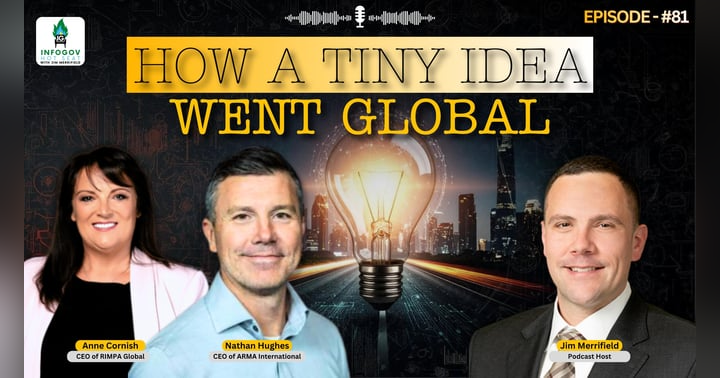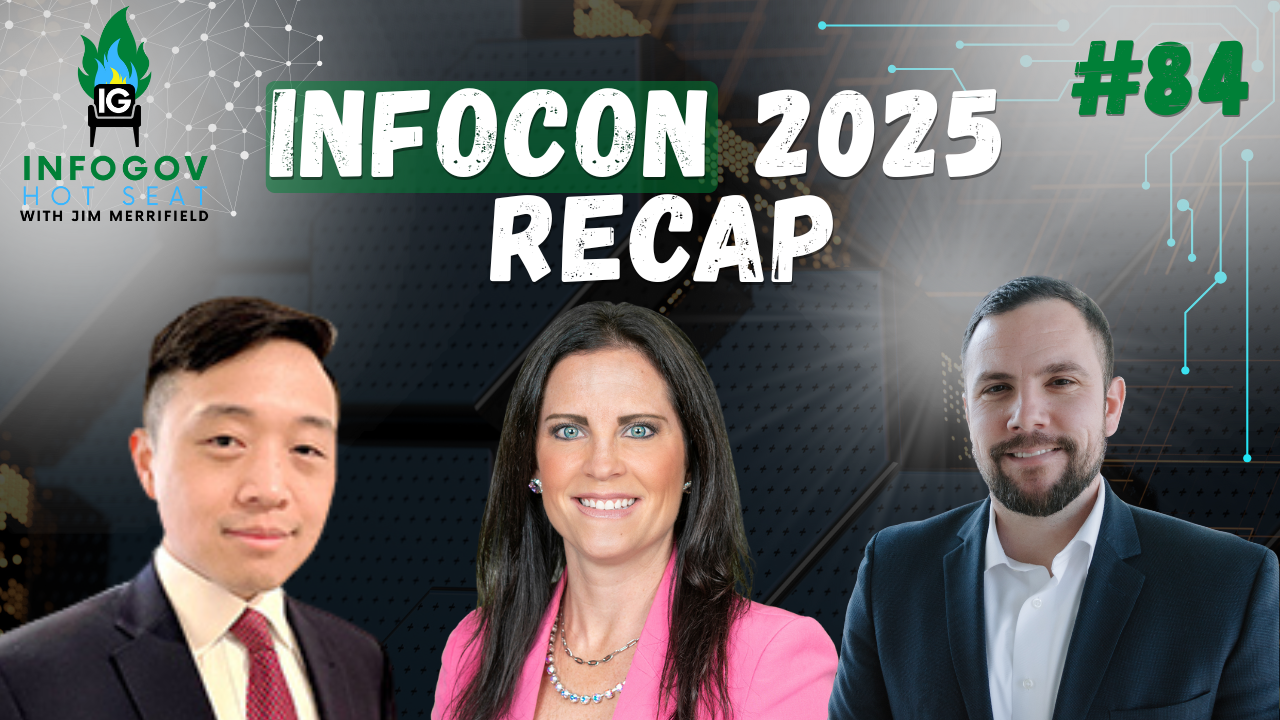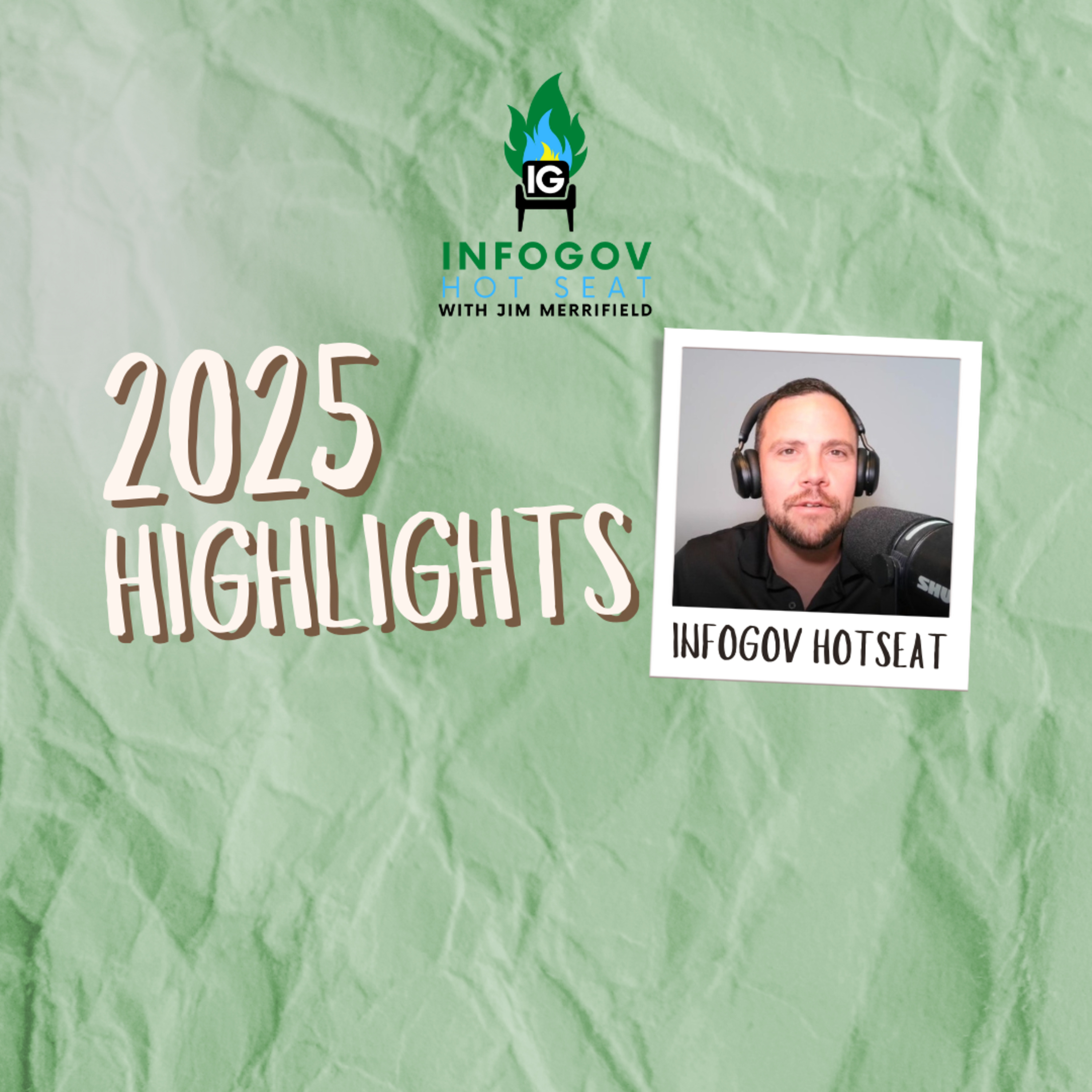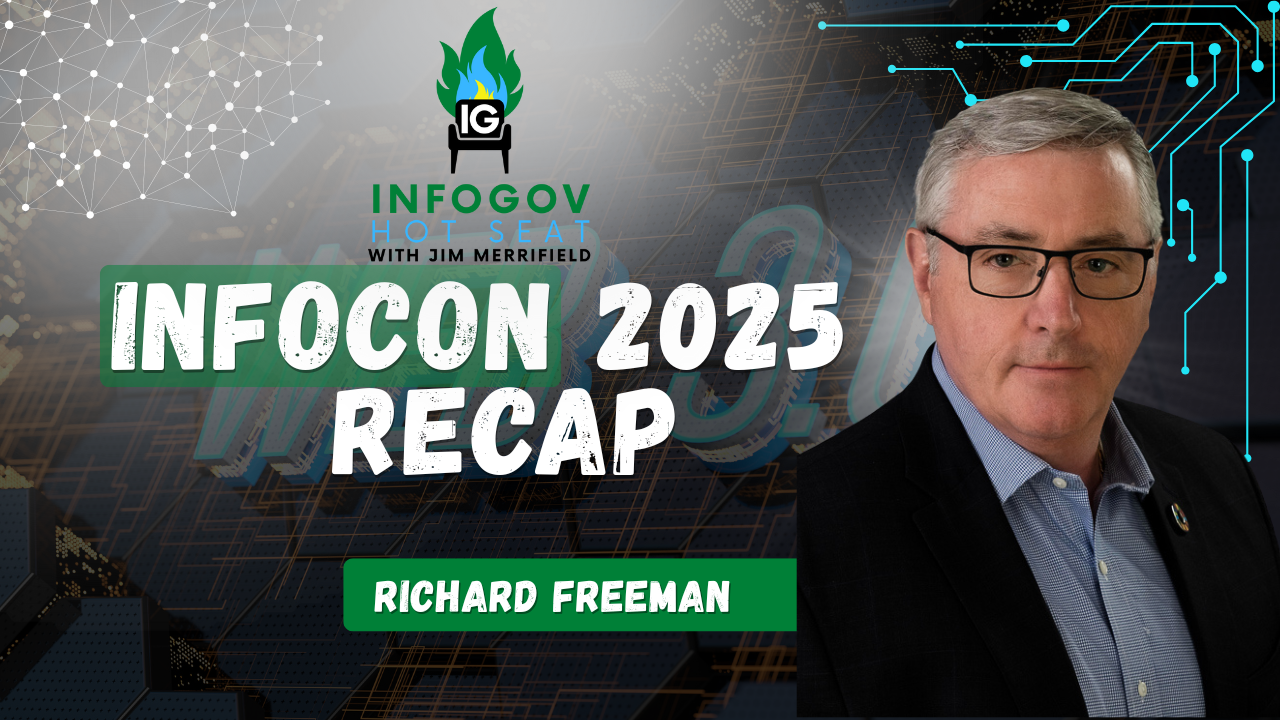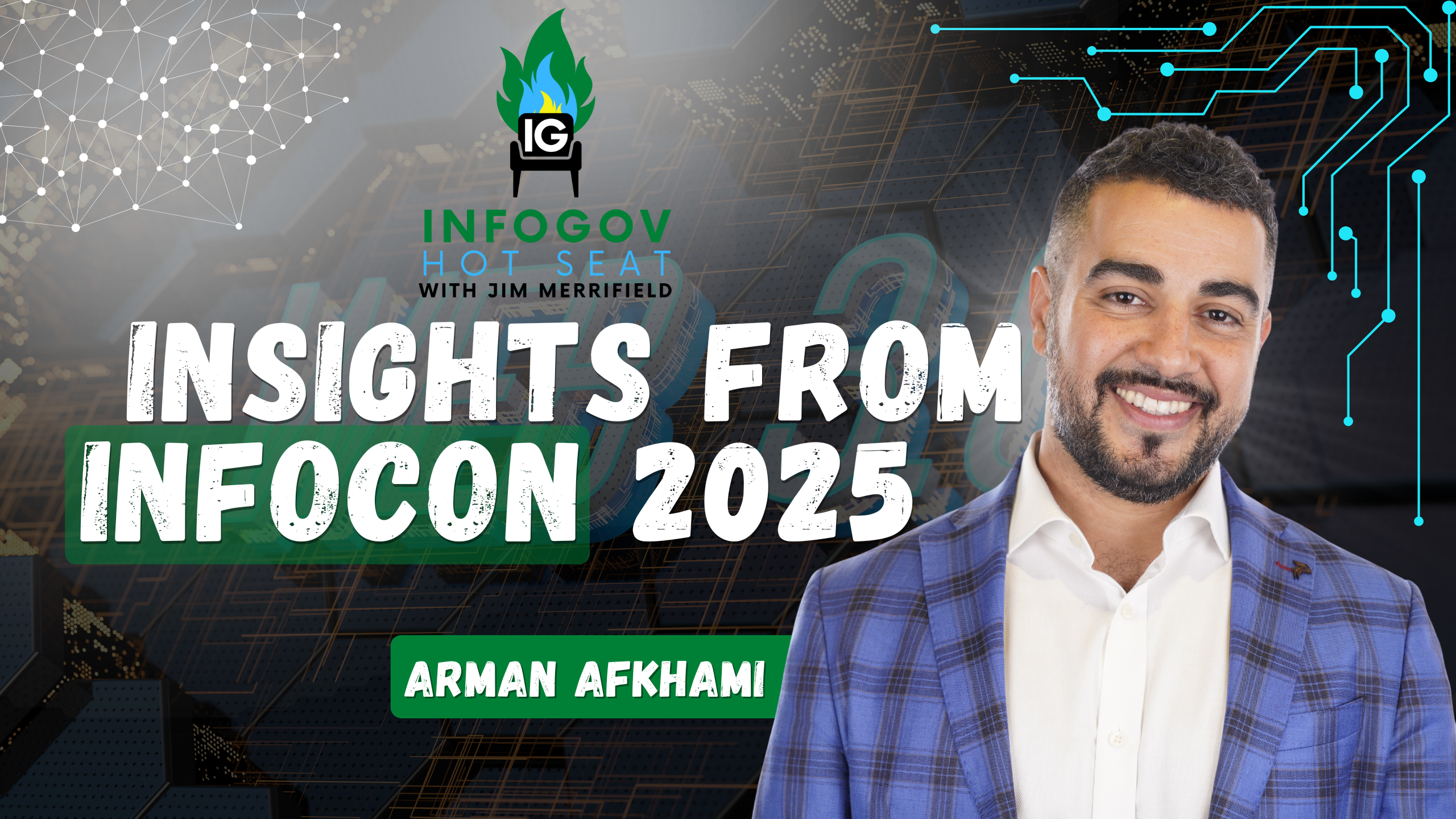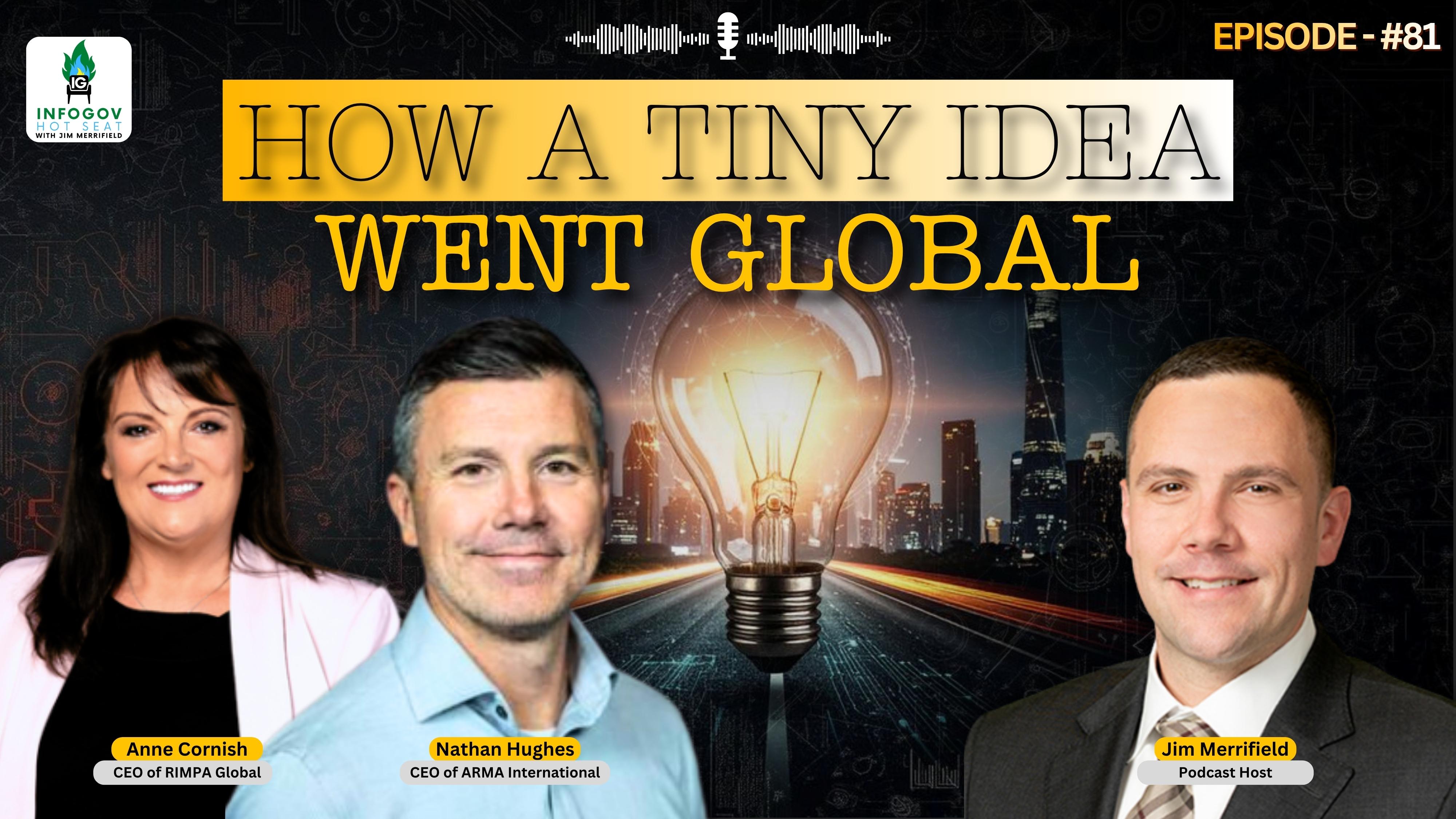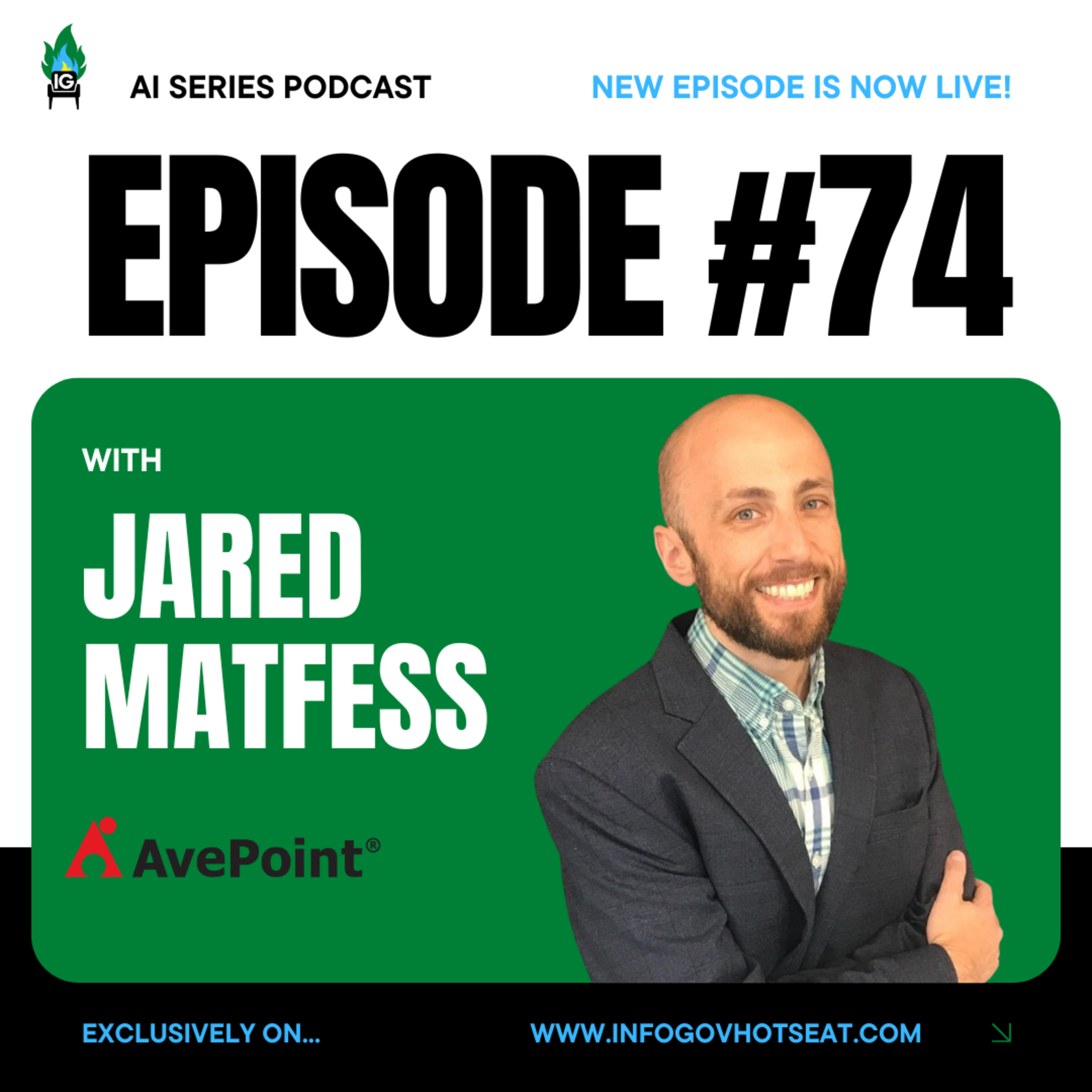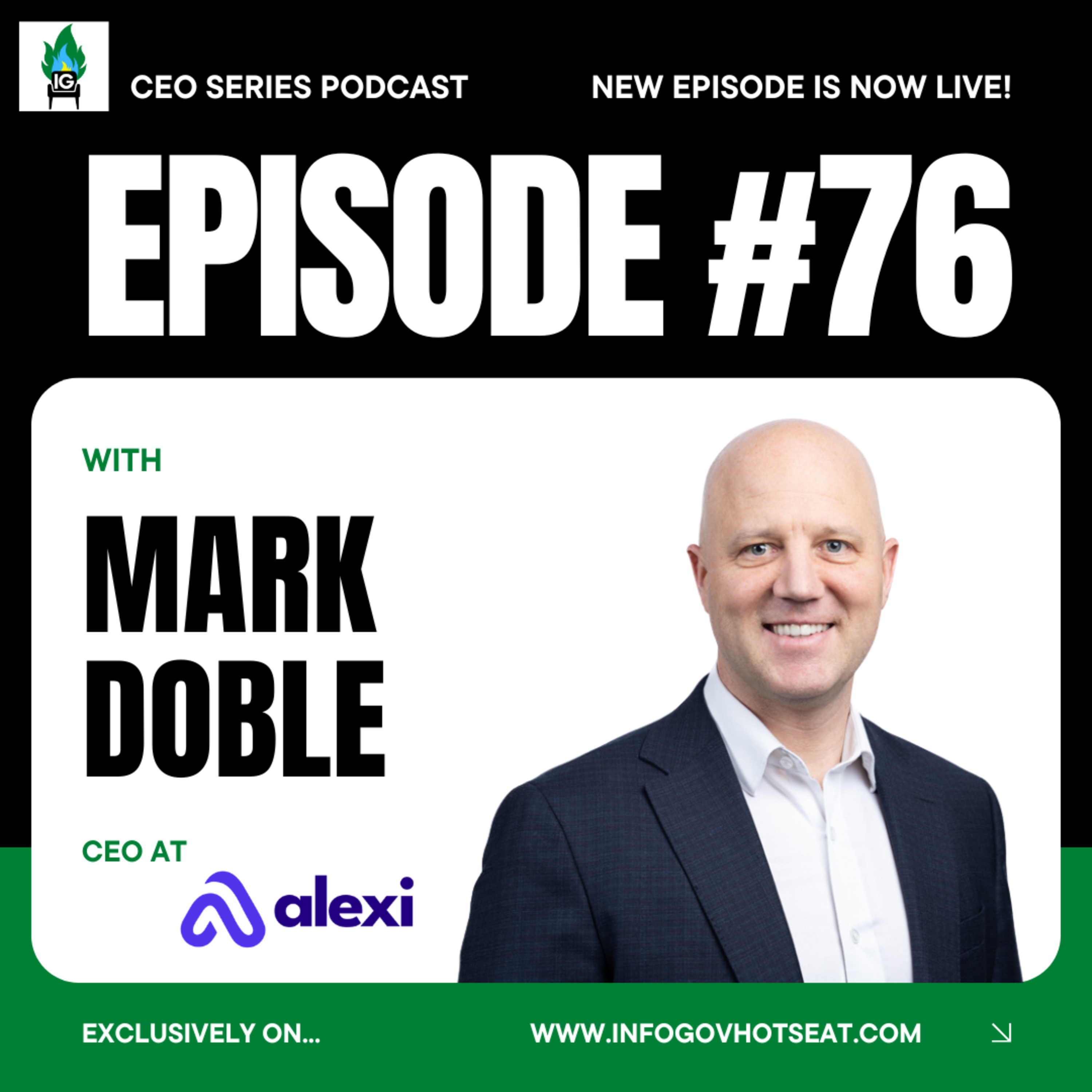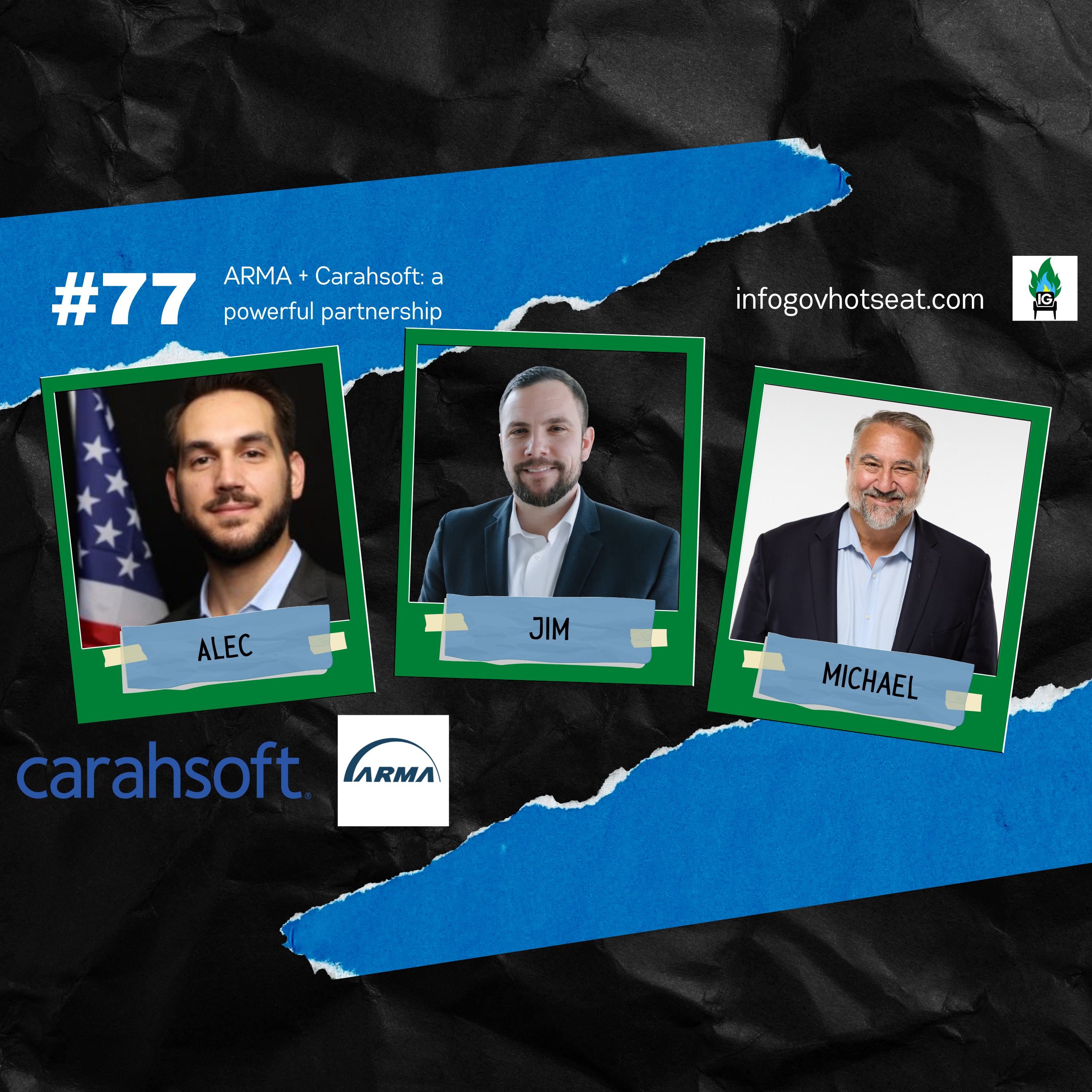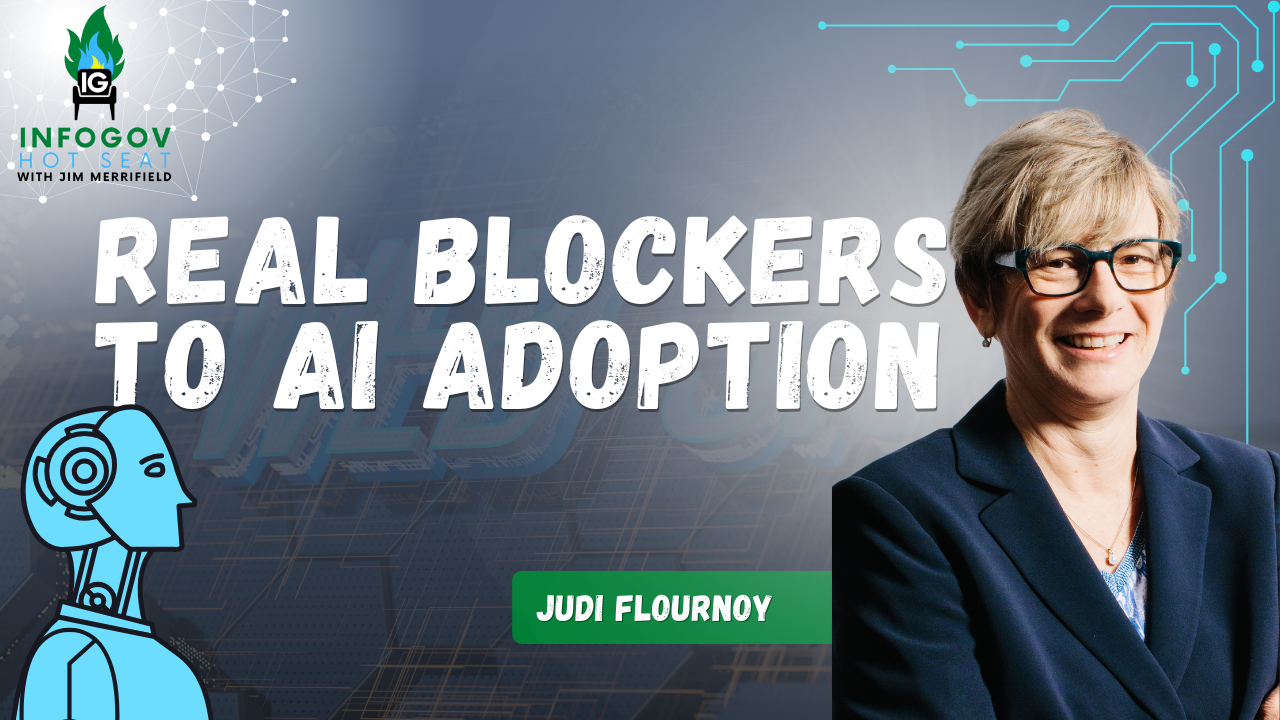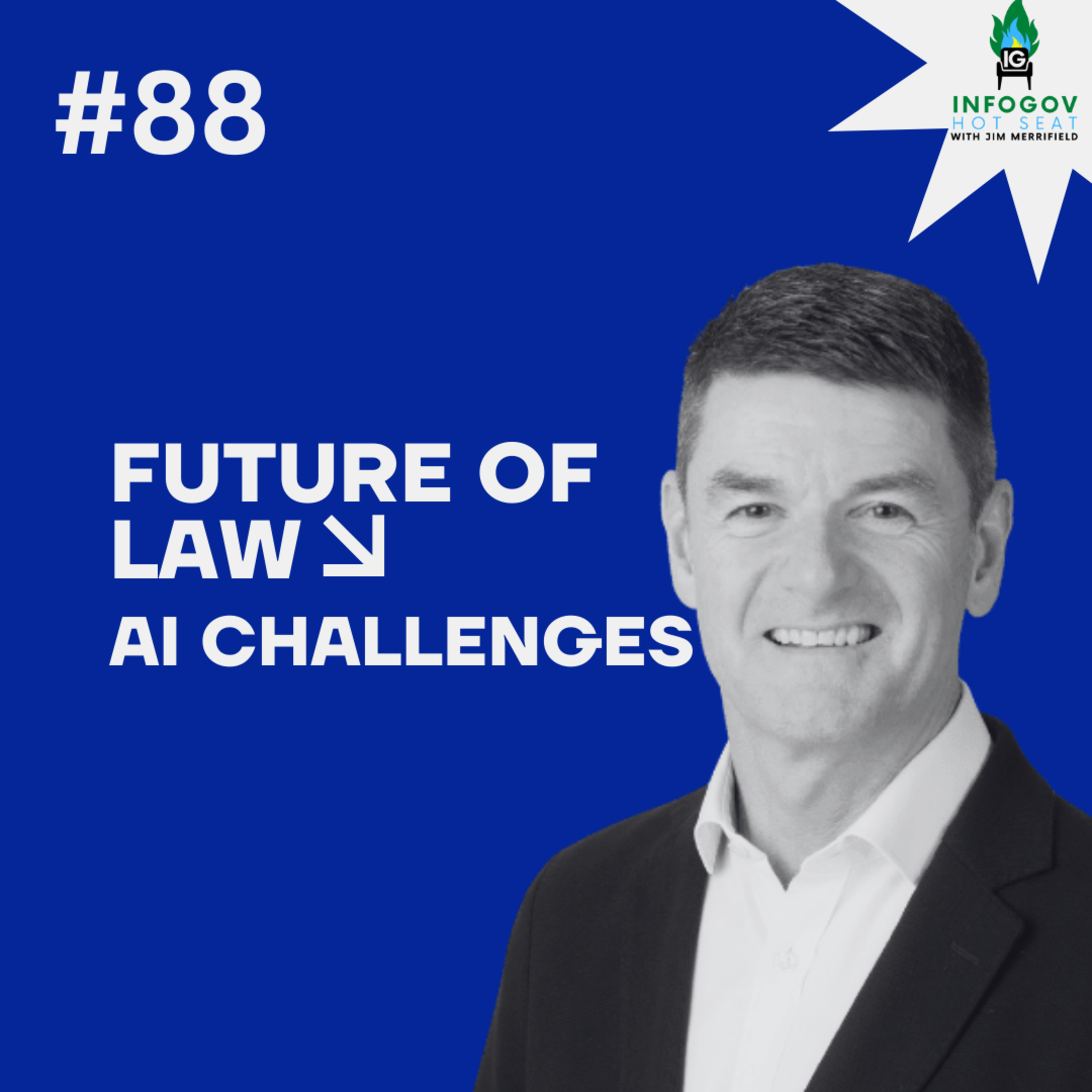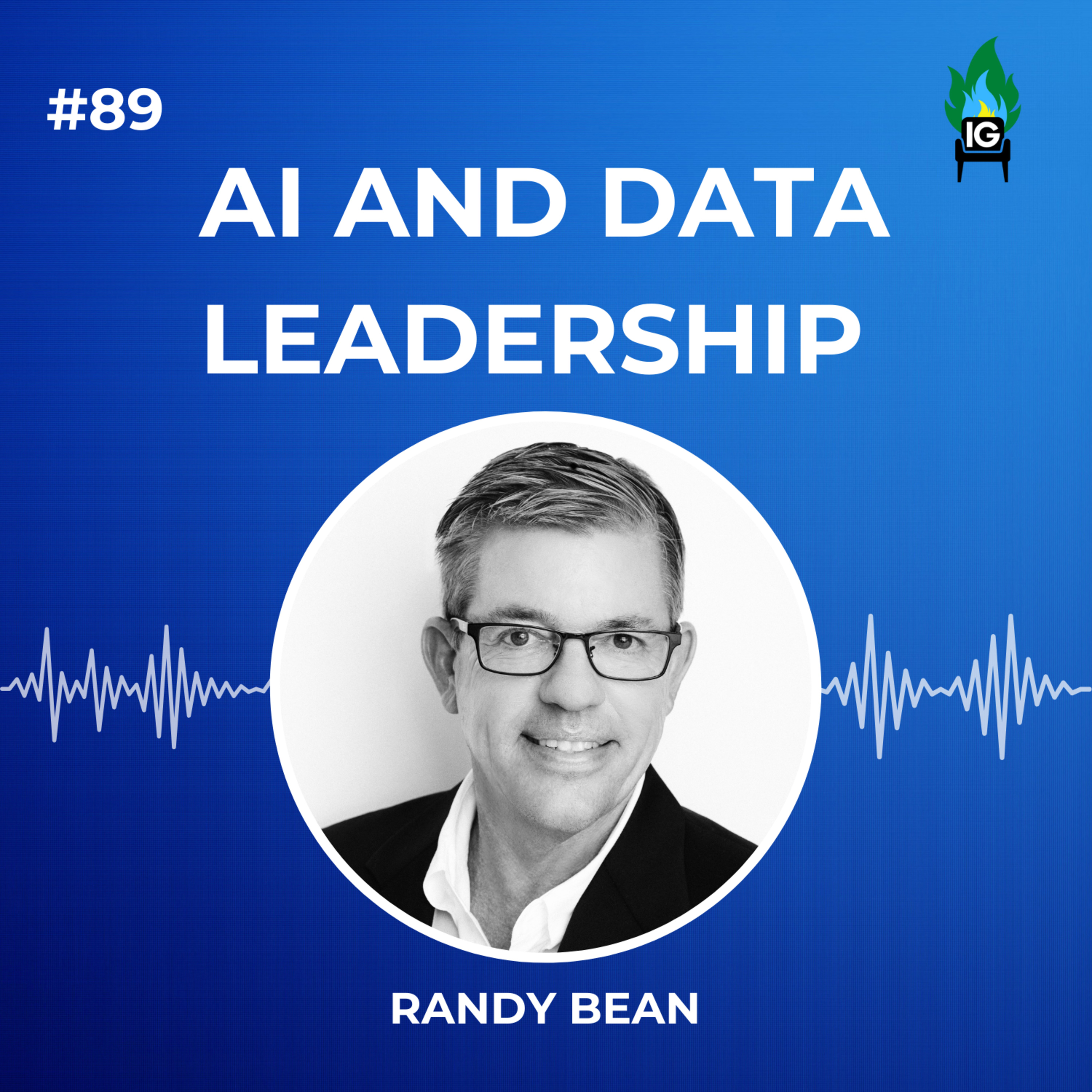How A Tiny Idea Went Global
In this episode of the InfoGov Hot Seat, host Jim Merrifield welcomes Anne Cornish and Nathan Hughes to discuss the Global Information Consortium (GIC). They share insights into the origins of the GIC, its vision for the future, and the importance of collaboration in the field of information management. The conversation highlights the challenges and successes of building a global organization, the evolving landscape of information governance, and the diverse membership that the GIC aims to cultivate.
Jim Merrifield (00:01.021)
Well, hello and welcome to the InfoGov hot seat. I'm your host, Jim Merrifield, and with me today are Ann Cornish, CEO at RIMPA Global and Nate Hughes, CEO at ARMA International. Welcome to you both.
Nathan Hughes (00:09.038)
you
Nathan Hughes (00:15.0)
Thanks, Jim.
Anne Cornish (00:15.742)
Thanks, Jen.
Jim Merrifield (00:17.363)
Yeah, it's great finally having not one but two guests on the hot seat here, right? At the same time, different time zones, right? So, which is really cool. So Ann, let's kick this off with you. Why don't we, why don't you share a fun fact about yourself so we can let the audience.
Nathan Hughes (00:20.632)
Both of it at the same time, yeah.
Anne Cornish (00:22.761)
Yeah.
Nathan Hughes (00:25.176)
Right?
Anne Cornish (00:25.288)
very much so.
Anne Cornish (00:33.492)
Okay, well fun fact. apparently the theory is that if you're a CEO, you actually can't cook or entertain. Which is apparently because every time I do that, people go, my god, you can cook. I actually really enjoy cooking and I love entertaining and the more people the merrier. So it's not unusual for me to have 40 people at Christmas Day with a three or four course meal. So.
And I just, it's my, it's a downtime for me. So it's a bit of a fun thing for me. I enjoy it, be creative and I like doing it on my own. So there you go. That's my, I don't know if that's fun, but it's a fact.
Jim Merrifield (01:10.419)
It is a fun fact. Who doesn't want to talk about food?
Anne Cornish (01:11.796)
Yeah, it is. I'm not even surprised how many people actually say, oh my god, you can cook. They think because you work in an office that you sort of can't do anything else.
Nathan Hughes (01:14.422)
You've never put me any food in. We've never had the chance.
Jim Merrifield (01:23.987)
you
Nathan Hughes (01:24.878)
Right.
Jim Merrifield (01:26.771)
That's too funny and of course and comes to us all the way from Australia, so thank you and Yeah early riser That's great and Nate why don't you provide a fun fact I know you've done that before but let's let's hear a different one
Anne Cornish (01:31.976)
Yes, yes, quarter past seven in the morning.
Yeah, definitely.
Nathan Hughes (01:42.488)
fun fact to come up with a different fun fact. I probably have one of the shortest, post college soccer careers ever, ever imagined. I was out there, got back into, indoor and was, you know, rare and to go, you know, missed, missed being on, on the field and out there. And within probably, I think it was two minutes, I, went up a guy up against a guy who was quite
quite a bit bigger than me. Now, I did lay him out, like I did get the ball, but I cracked my clavicle two minutes in and that ended my soccer career for the rest of my life. So, fun fact, I guess it's not a happy fact either, but something interesting, I guess.
Anne Cornish (02:28.574)
Hey, guys.
Jim Merrifield (02:34.673)
Wow, that is interesting. And now you know, your fallback plan was a CEO at Arma. So not too bad. Yeah, absolutely. So let's talk a little bit. I know the two of you been working. I think it's been what three years been working on the GIC, right? The Global Information Consortium. It's three years in the making, which is pretty remarkable. So why don't we take us back to the early days? How did the GIC start?
Nathan Hughes (02:39.662)
There you go. It all worked out in the end.
Nathan Hughes (02:52.206)
Mm-hmm.
Jim Merrifield (03:04.679)
Where did that idea come from?
Anne Cornish (03:09.0)
Can I start, Nate, if that's all right? So, excuse my pronunciation for the Americans, but we say consortium, not consortium. So anyway, so consortium. So, Arma and Mimpa, as you know, Jim, have been talking for some time, and thanks to Nate, Mimpa approached Arma, I think, and said, like, let's have a chat, because we're very similar in our countries, and we did. And Nate and I got on, on straight away, and had very similar
Nathan Hughes (03:10.21)
Yeah, go for it. Go for it.
Jim Merrifield (03:10.461)
Sure. Ladies first.
Jim Merrifield (03:17.139)
Alright.
Anne Cornish (03:38.205)
Aspirations or passion, I think is probably a great word for it, for this industry. And we want it to be a bit bigger than what we were. And we knew that this is a global and information management impacts globally, sorry, is an impact globally. And we, we thought we can't do this on our own or individually. We need to do this collectively or collaboratively. And that's really where it came from. Wasn't it? It was a general sort of informal
And I had this big thing about, you know, we want to have a bigger voice. This was my big, you know, let's have this huge voice, not one voice, because I think sometimes we're we're not always going to agree, but a bigger voice in particular instances. And it sort of grew from there. You agree, Nan?
Nathan Hughes (04:20.844)
Yeah, I mean, it really grew out of the partnership that both our organizations, but really, honestly, I don't think we would have been here today had Ann and I not clicked as well and just fed off each other for the different ideas and the different ways that both of our organizations wanted to give back to the community and build the community and really do something bigger than just what we were doing.
within our organizations. And thank goodness, both of our organizations also agreed. I think that was a strategic vision on both the ARMA board side and the RIMPA board side that this is something that was important enough to invest the time and the money and the resources into seeing what this would be. And it took a while in the beginning and everybody always says,
you know, why did, why did things take so long? Well, you have to make sure that we have the right people involved and we're saying the right things. It's, one thing to have an idea amongst two organizations. It's another to come up with an idea that's going to resonate with, with other organizations as well. And, know, we did focus groups, early on in the beginning, at InfoCon and during a RIMP alive, or that timeframe, right. And, or, or involving, lot of the RIMP membership and,
kept hearing positive feedback about the need for this and the desire for others to want to be involved as well. So it of kind of a warrant out of that.
Anne Cornish (05:58.325)
And you know, what you and Nate, you'll agree with me. It really made me realize this whole process has made me realize how hard it is to start a brand new group for want of a better word or, know, because Nate and I obviously came in and our associations or our organizations were well in existence for a long, long time. And it sort of makes me really appreciate the people right at the start now that the amount of time and effort they had to put in to get it going. Cause it's...
Jim Merrifield (06:10.013)
Thank
Anne Cornish (06:25.236)
And Nate and I, just to give you bit of background, this is probably another fun fact. The people at work call me Nike. Like I'm one of these, just do it. I hate waiting and I don't have a lot of patience and I want things done now. And then worry about the consequences if you're already after the fact. And Nate's a little bit the same, aren't we? We just want things done. So this is a struggle for him and I in the sense of that it's taken three years to get to this point. We wanted it probably.
Jim Merrifield (06:33.849)
Thank
Anne Cornish (06:52.036)
if we had it our way, would have been at this point after six months. But it really does make you appreciate what's involved and the time requirements to get things done. And we are doing this as a voluntary aspect. obviously as CEO of Armour and Rimpa first, and then the GIC, unfortunately, second, which I know there's time as an AI, we would love it to be first, but it doesn't work that way, it? Sorry. Yeah.
Nathan Hughes (07:13.166)
Right. Right. And just to be able to get global buy-in from other organizations is a time-consuming process. It takes a while to convince somebody of the idea and why to get involved and to put their valuable volunteer resources towards this organization as well, because everybody has just a small amount of time to give outside of what they do as their core
you know, job or volunteer or organization or whatever. And to be able to find people that are just as passionate as we are to volunteer their time and their, the consideration of their organizations has been, it's been, it's been amazing, but it takes time. It takes time.
Anne Cornish (08:00.562)
I must say I struggled that component or that part of it at the start because Nate and I were both, I just can't believe that the people don't have the same passion that we had. And I'll be honest, I thought it was going to be an easy sell, right? Up front, that we were going everyone was going to go, yep, we're going to jump in on board. The GIC is amazing, let's do this. And it's not that, I don't think the concept, I think the concept was, it's just about, you know, they want the proof in the pudding as such. They want runs on the board, whatever you want to call it, before they'll put their money.
Jim Merrifield (08:15.155)
Thank
Anne Cornish (08:30.503)
where their mouth is. that's a valid point. I get that. Not as passionate as you and I necessarily in the concept, but that's coming. Now the momentum's there. It's really coming along, which is great. Just taking three years.
Nathan Hughes (08:44.75)
Yeah, I would say that that's probably occurred over this last year. With the final formation of the Global Council, consisting right now of 10 organizations around the globe, and having those means and having that invested interest now in the working groups and working towards the goals and the things that we're looking to do.
Anne Cornish (08:49.095)
Okay.
Nathan Hughes (09:12.782)
out of the consortium, I think it's finally gotten to that point where people can see now what we are actually doing and how it's actually going to be portrayed to the world and that type of thing. And what they can take back to their organizations and their memberships and say, hey, we're invested in this organization as well. And you're going to be a part of this thing that's bigger than just us. So that's been great.
Jim Merrifield (09:39.847)
Yeah, now it takes time and it's been great to think for the ARMA folks to mingle with the RIMPA folks over the years and get to know one another. So it's been awesome. So now that we've heard the backstory, let's fast forward a bit. What's the future vision for the GIC and how do you see that vision coming to fruition? I don't know, Nate, you want to take that one?
Anne Cornish (10:02.931)
You can get a face system.
Nathan Hughes (10:05.166)
I think we're already starting to see the trail of that progression and where we want to be. And I guess the end game, right, is we want to be the organization globally that people come to to ask about perspectives and thoughts around policies and what needs to be advocated for. know, like Anne said, all the organizations that are involved are not always going to agree 100 % of the time on everything.
But coming together on all the things that we can agree with, we kind of have always talked about it as United Nations of Information Governance and Information Management. We're there to give everybody a voice, but then also find the things that we can come together on that we know, making sure that there are programs even out there is a big piece of advocacy that we want to do for.
government and private organizations. There's so many people that aren't doing the things that they need to be doing in this area. And not only that, just having the policies and legislation and things like that in place to be able to empower the people that are already doing what they're doing, to be able to do it right. That's what we aim to be. And beyond that, really look to be a resource for people that are unaware of what is out there.
to come to the GIC and see what we're talking about, but also be able to get a glimpse into all of the offerings that the organizations that are a part of the consortium have to offer. There are so many different certifications and education areas and communities that are out there within these organizations. And while the GIC is there for this big picture, bigger voice,
aspect, you may find that the needs that you have are served by one of the organizations that are a part of the GIC, and we're there to kind of be the mouthpiece of those organizations as
Anne Cornish (12:10.717)
Yeah, and it's been interesting that you said we mentioned that it's been take three years in the making. We three years ago, I mean, obviously did a bit of consultation and collaboration and then I think 12 months after that, we started to create a strategy for the GIC so that we could actually demonstrate to those that wanting to come become involved that there is a plan. We're not just talking here as a plan. But in the last, in even the last 12 months, that plan has evolved because this industry just keeps changing as we all know.
And so what was relevant and it still is relevant, but don't get me wrong, but what's become probably more relevant or more pertinent trending right now has changed. Three years ago, we started this AI was a concept and now AI is just in our face. And this is at the last meeting of the GIC, which was only a few months ago, the focus in the strategy is going to change. So we're looking at emerging technologies, not more so, but in addition to, and maybe have some focus areas.
And then there's also things like privacy and cyber security all of a sudden have come into play. They're really predominant. And that's global, that's global everywhere. mean, that's here. I'm gonna say here in Australia, it's in the US, it's in the UK. We're all talking cybersecurity, privacy and AI, think are probably the three main topics. So in saying that as much as what we want to achieve, we had two years ago, as I said, it keeps evolving. that's...
That's a good organisation in my opinion to evolve with what's trending. If we just stayed still, I think we'd become defunct before we've ever started. So, yeah.
Jim Merrifield (13:41.747)
Thank
Jim Merrifield (13:48.275)
Yeah, and I think it'll continue to evolve, right? There's always emerging technologies, different functions and business units and things. So definitely a bright future ahead. So right now, which associations and organizations are a part of the GIC? Because I know there's several members actually of the GIC.
Anne Cornish (14:10.354)
Yeah, and I'm gonna let Nate, because I know Nate's got the list right in front of him and then we won't miss anyone.
Nathan Hughes (14:14.255)
Yeah, yeah, yeah, yeah, yeah, yeah, yeah, yeah, yeah, yeah, yeah, yeah, yeah, yeah, yeah, yeah, yeah, yeah, yeah, yeah, yeah, yeah,
The ICRM, ILTA, which I know you're very familiar with, Jim, and your other volunteer side of things. iSigma, Karma out of Kenya, and Negara are all members of the Global Council. We have a number of other organizations that are in the final stages of joining the Global Council as well. And then we have...
other organizations that have, what's the term that we use as far as like the working group for the, yeah, kind of affiliate members. So we have opportunities for other organizations to be a part of the GIC in different capacities. We know that there are governing bodies out there or government appointed bodies out there that would like to be involved in the GIC and have given us feedback and been a part of.
Anne Cornish (15:16.251)
supporter or affiliate.
Nathan Hughes (15:40.279)
conversations, but can't truly be a member just in their capacity of their positions. Along with that, you're going to be better at the exact working group for the ISO.
Anne Cornish (15:53.364)
So we've actually quite fortunate that we've got the ISO standards committee, is the SC 46, sorry, TC 46 SC 11, which is specifically the archives and records group under the ISO. And Michelle Tolade, who is Australian, is actually the chair and president of that group. And we had our friend from France that came to the RA Carlos, who actually runs the TC 46.
So really, really supportive from the ISO standards point of view, which is really what Nate was saying before about, you know, having standards and policies and that sort of thing. So they unfortunately can't participate and be a voting member of the GIC, but they fully support the GIC. So they can create the standards and they were hoping the GIC will promote the standards. So that's really where the partnership comes into play. But, and we're missing probably, not, and I'm going to say missing because
When we say GIC, when we use the word information, it's about all the disciplines of information. So we're talking about data and knowledge and content and libraries and archives and records and governance. you know, and it goes on and on and on as we all know. none of that, not all of those parties or organizers, not all of those disciplines have been represented as yet. And that's probably our big aim, isn't it, Nathan, to make sure that the global council has...
a library representative, an archives representative, a governance representative, a records management, a content and a data. And they're the people we're talking to at the moment. We're probably this far away from bringing in some of those disciplines into the GIC just to broaden the scope of what we do, which will be great.
Nathan Hughes (17:37.667)
You know, I would say, you know, a call from us to everybody watching this is if you are a member of an organization that is, that wasn't mentioned already in the global council and you feel like it's a, it's a worthy thing for your organization to take a look at, to, reach out to us and, and let us know no matter how big, how small we've talked to organizations that are in probably the tens of members.
in certain areas, but they're doing good work and they're growing and they're looking for this perspective and to be a part of something like this. And there's opportunities to volunteer and be a part of the organization to keep it moving. The more people we have involved, the better this is gonna be.
Anne Cornish (18:22.104)
Don't you think too that's, and I'm sorry just to continue on with that, but the developing, what Rinpo referred to as IAM developing countries, so those countries that are still really trying to make a big sort of lead way of be forerunners in, or sort of move forward in the IAM space, are really interested in the GIC. So that's why with Karma, we've got the Kenyans on board and their reason for getting on board is that they just want to learn. They want to have access to the resources.
globally that are available that they don't necessarily have and don't want to rewrite or have to reinvent the wheel, Jim, to be quite honest. And we've got Indonesia just about to come on board. And we know that Papua New Guinea is another one. And I appreciate they're on my side of the world. But in saying that, they are the developing countries that really, I think, will benefit, do you agree, this, the GIC, maybe in a different way, not from the advocacy way, but from the learning perspective.
Yeah, so it's a bit too far, which is great.
Jim Merrifield (19:22.619)
Yeah, it's great mix. It seems like it is truly global, not just between the two organizations here, but just the organizations that you've mentioned that have already taken advantage of participating and ones that you have kind of right on the edge is awesome. So we'll look to see that grow into the future for sure. So I know, Nate and we've talked about a few things here. I know we could go on and on, but is there anything that you'd like to share?
with the audience before we let you go. Anne will give you the first crack.
Anne Cornish (19:56.69)
yeah, that's probably a bad move, Jima, because we're already 20 minutes into this session, or we could keep going. I just, think we've shared, I mean, what we've aimed to share today in this podcast, but in saying that, think it's a really, I do really have a big passion for this bigger voice. So to advocate collaboratively, I think we can achieve so much more. My big thing is that my vision is that records or information management is understood and
Nathan Hughes (19:59.663)
Yeah.
Anne Cornish (20:25.721)
appreciated and valued, I think, by everybody in society, not just organisations. So to do that, I think that's where the GIC comes into play. So I'm hoping, I know, I want to make information management sexy, but my husband believes I'm going to die quite unsatisfied. So I just thought I'd let you.
Nathan Hughes (20:43.043)
you
Jim Merrifield (20:44.531)
Well, I think AI did,
Nathan Hughes (20:47.183)
Truly, I would just like to add to what Anne said as well. The work that the GIC does outwardly is going to be huge. But I think what I have enjoyed the most is seeing the organizations that are involved on that global council level, or even the discussions that we're having along the way.
even if they haven't ended up with a partnership in the GIC or a global council seat or a supporting partner or something like that, they've created partnerships with the different organizations within the consortium. And just us talking and having the leadership talk of those organizations and the volunteers talk in those organizations, it both cements what we're doing because we hear the same thing over and over again. And we can also
you know, learn from each other and find out how we're doing things right, ways we can make things better for our members and our organizations and just the industry as a whole in our small little ways. So there's all the things that the GIC is doing outwardly, but I think it's just as important the work that's going on internally with the discussions going on with the people involved and the organizations themselves just.
becoming closer and understanding each other better and really being able to identify the needs of all of us. So it's been really cool. I wouldn't trade it for anything. It's been a lot of work to get to this point and think Anne would echo the same and not just for us. I don't wanna make it sound like it's just Anne and I. There's a lot of people involved in the work that goes on here from the staff on both of our organizations and all the volunteers that put in.
hours at some weird times during the day to put in, you know, three, four, five, six hours at a time to make this thing better and continue the momentum going. So it's been great. I'm looking forward to seeing what comes up and getting invited back on here to talk about it more.
Anne Cornish (23:03.495)
Yeah, yeah. I bet you if you talk to us in 12 months time, there'll be a whole nother involvement of our strategy and there'll be something new, some new emerging technology or some change in our industry.
Jim Merrifield (23:03.891)
Yeah, for sure.
Jim Merrifield (23:15.729)
I'm sure, I'm sure. Those are some great insights and thank you both for joining us today on the hot seat. It's been inspiring to see how one single idea has grown into something real and with a global reach. So kudos to you both and both organizations for making that happen. I have a feeling that when we do connect next, there'll be lots more to share.
So for our audience, if you'd to be a guest on the InfoGov Hot Seat, all you have to do is submit your information through our website, infogovhotseat.com. And thank you so much and enjoy the rest of your day. And thanks again, Ann and Nate.
Nathan Hughes (23:53.487)
Thanks, Jim.
Anne Cornish (23:53.533)
Thanks, Jim. Thanks, Thanks, Nye.

CEO
Nathan Hughes, CEO of ARMA International, has been a driving force within the organization since 2015. With his extensive expertise and leadership experience spanning over 20 years, Nathan has played a pivotal role in guiding ARMA's strategic direction and spearheading various initiatives. Having excelled in diverse corporate and non-profit roles, he has effectively managed complex technology, operations, and logistics functions at senior-level positions. Nathan is a highly accomplished professional with credentials including IGP (Information Governance Professional), CIP (Certified Information Professional), and CAE (Certified Association Executive).









